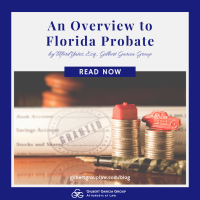An Overview to Florida Probate

When a loved one passes way, what happens to the assets titled in their name? When someone dies, they are known as a decedent. Probate is the legal proceeding in which a decedent’s assets are legally transferred to their living heirs or beneficiaries. If the decedent passed away with a will, they passed away (testate). The will serves to instruct the court on who will oversee the probate process (personal representative), and who is to receive the decedent’s assets. If the decedent passed away without a will, they passed away (intestate). In that event, Florida law will dictate who receives the decedent’s estate based on the decedent’s living relatives.
There are two types of probate administrations that can be filed in the state of Florida. There is formal probate administration and summary probate administration. The set of facts surrounding the decedent’s estate will determine which administration is appropriate. Probate is governed by Florida Statutes Chapter 733.
Formal Probate Administration
Formal Probate Administration is required in Florida under one of two circumstances: (1) when any estate with non-exempt assets are valued at over $75,000, or (2) when a personal representative is needed to settle the affairs of the decedent.
A personal representative is appointed by the court to represent the estate in formal probate administration. It is the personal representative’s job to ensure the transfer of the decedent’s assets to the intended beneficiaries or heirs throughout the probate process. Specifically with formal administration, the personal representative must publish a notice to creditors. This allows creditors of the decedent to file a claim against the estate within 90 days.
What are some examples of exempt assets? In Florida, a decedent’s homestead property, the home where they lived, is exempt. Furthermore, household furniture and appliances up to a net value of $20,000, and two motor vehicles held in the decedent’s name are considered exempt property. Since these assets are exempt, they are excluded from the value of the estate. More importantly, these assets are exempt from creditor claims unless a creditor has a perfected security interest.
Once the personal representative has completed their job including accounting for all estate assets, paying creditors, and distributing the estate assets to the appropriate beneficiaries or heirs, the estate may be closed, and the personal representative may be discharged.
Every case is different, however, formal probate administration, on average, takes 6-9 months to complete.
Summary Probate Administration
Summary Probate Administration is quicker and cheaper than formal probate administration. A personal representative is not appointed in this type of administration, making the process less involved and more efficient. Summary Administration, on average, takes about 1-2 months to complete.
An estate may qualify for summary administration if either a decedent’s estate is valued at less than $75,000 in non-exempt assets, or the decedent passed away more than two (2) years ago. If one of these two scenarios apply, a loved one may petition the court for this type of administration. A decedent who died more than 2 years ago may have an estate valued at more than $75,000.
In summary administration, a petition for summary administration is filed with the court, and all interested parties to the estate are given notice of the proceeding. If there are known creditors of the decedent, notice must be given to them as well. However, if the decedent passed away more than 2 years ago, creditor claims are forever barred.
Since there is no personal representative appointed, once the court receives all necessary pleadings and proper notice is given, the court will sign an order of summary administration. This signed order will legally transfer the decedent’s assets to the appropriate beneficiaries or heirs.
Schedule a Complimentary Consultation!
With many different factors and circumstances, it can be difficult to ascertain which administration to file, and who can even file the probate administration. Please give us a call here at Gilbert Garcia Group for a free consultation! One of our experienced Probate Attorneys will walk you through the process and provide peace of mind during a stressful and emotional process.

